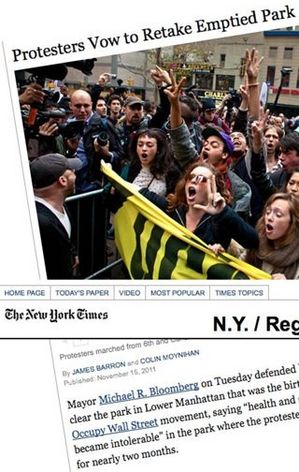Do we support Occupy Wall Street?

The NYTimes Story changed headlines and key details multiple times on Tuesday.
But, let’s stop and ask the key question: Do Americans side with Occupy-movement values?
The movement’s values are not always clear, but they hover around ideas of equal opportunity and economic equality. In response to the Occupy protests, the Public Religion Research Institute explicitly included questions about these values in the 2011 American Values Survey. Here’s what they learned.
Overall, a slim majority of Americans (53%) believe that “one of the big problems in this country is that we don’t give everyone an equal chance in life.” Not surprisingly, a much larger majority of Democrats (70%) believe this is a big problem, while just over one-third of Republicans (38%) feel the same way. Independents (a growing block in the electorate) are divided. Half (50%) say not giving everyone an equal chance in life is a big problem, while 43% say it isn’t.
A larger majority (60%) of Americans say “society would be better off if the distribution of wealth was more equal.” Not surprisingly, affluent Americans are less likely than poor Americans to agree. And, older Americans are less likely than younger Americans to agree. There are also big differences by party affiliation. Over three quarters (78%) of Democrats believe that economic inequality is a problem, compared with about one-third (35%) of Republicans. Economic inequality, as we’ve discussed before on OurValues.org, is now at record levels.
How do you feel about these issues raised in the poll?
Is the widening gap in income and wealth a serious problem?
Is the Occupy movement making a helpful contribution on this issue? Or not?
Occupy isn't the Civil Rights movement, expert argues
1.) Can the Occupy movement succeed?
2.) Should we tax the rich and raise the minimum wage?
First: Will the Occupy movement make a difference? Not likely, and that’s not due to lack of sincerity. Most grassroots movements don’t end up influencing policy changes. The one giant exception is the Civil Rights movement. But most don’t come close.
“Winning is uncommon,” writes sociologist Claude Fischer, “but the general formula for winning seems to be that the protesters are going with the tide of public opinion; have allies in powerful places, especially the White House and Congress; are organized, disciplined, and hard-working; are focused on specific policy goals; can be seen as innocent victims of attacks by reactionaries; and more broadly are seen as virtuous by the general public.”
Many of these elements of success are obviously missing in the Occupy movement—except for going with the tide of public opinion. And, that’s where we come to today’s second question.
As we discussed yesterday, the majority of Americans believe that our society would be better off if the distribution of wealth was more equal. Two ways to accomplish that goal would be to tax the rich and raise the minimum wage. The Public Religion Research Institute asked about these issues in the 2011 American Values Survey.
A large majority of Americans (70%) support increasing the tax rate on those earning more than $1 million a year. Democrats are more supportive than Republicans of the idea (not surprise there) but just more than one half of those who affiliate with the GOP (52%) supports the idea. The Tea Party wing, however, does not—only 40% favor taxing the rich.
Two-thirds of Americans (67%) favor raising the minimum wage from $7.25 to $10.00 an hour, the poll finds. Again, there are differences by political persuasion. More than eight of ten Democrats (82%) favor raising the minimum wage, but 52% of Republicans feel the same way. Only 41% of Tea Partiers support the notion.
What do you think about the Occupy movement’s long-term impact?
Would you like to see income inequality decreased by taxing the rich?
Or, raising the minimum wage?
Please add a comment below ….
and connect with other OurValues readers via Facebook!
Originally published at www.OurValues.org, an online experiment in civil dialogue on American values.
Dr. Wayne E. Baker is a sociologist on the faculty of the University of Michigan Ross School of Business. Baker blogs daily at Our Values and can be reached at ourvaluesproject@gmail.com or on Facebook.

